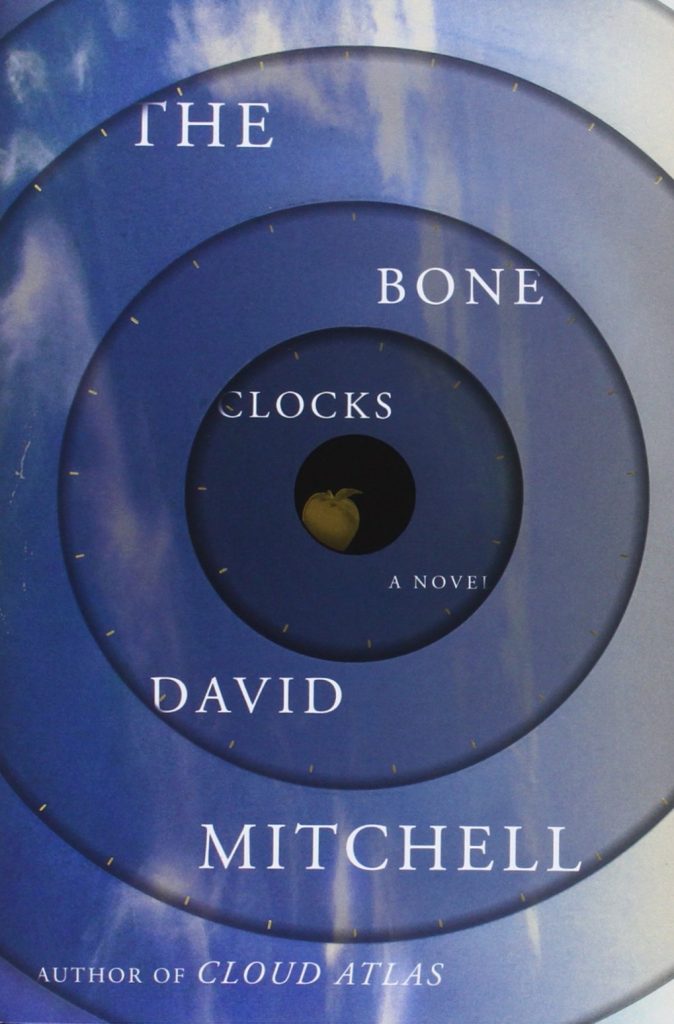Book review: “The Bone Clocks”
 Time for another book review! This one’s for The Bone Clocks, the most recent novel by David Mitchell, author of the absolutely stunning Cloud Atlas (which was later made into a substantially less stunning movie).
Time for another book review! This one’s for The Bone Clocks, the most recent novel by David Mitchell, author of the absolutely stunning Cloud Atlas (which was later made into a substantially less stunning movie).
The Bone Clocks is the story of sixty years in the life of Holly Sykes, who we meet at the opening of the book as a rebellious English teenager in 1984 and leave at its close as the wistful matriarch of an ersatz, improvised family in 2043. Holly’s story begins with a series of strange events, including the mysterious disappearance of her younger brother Jacko, that propel Holly into the middle of a secret war between two factions of supernatural beings — a war that will impact not only her life, but the lives of everyone around her.
I’ll cut right to the chase and tell you that I really liked this book. I didn’t love it — for reasons I’ll get into in a moment — but I really, really liked it. It’s definitely worth your time.
Structurally, The Bone Clocks has a lot of things in common with Cloud Atlas. It’s organized as a series of vignettes, with long spans of time (usually around a decade) separating them. Some of the vignettes are told from Holly’s point of view, while others are from the perspective of a person passing through Holly’s life — a caddish student who briefly becomes her lover, a childhood friend who eventually becomes her husband, a famous writer whose star is declining as hers is rising. These characters are all drawn compellingly enough that they could easily fill novels of their own. And it’s moving to see a character we last encountered twenty or thirty years ago pop up again in the margins of someone else’s story and notice all the ways they’ve changed, which Mitchell is smart enough to trust we’ll pick up on without his needing to call them out.
Mitchell is also deft enough to avoid the common flaws in stories with fantastic/supernatural elements that I noted in my review of Haruki Murakami’s 1Q84 — failing to establish the rules of their world, or to play by them consistently once they have been established. The Bone Clocks takes its time explaining how the “magic” of its universe works, but once it does, its internal logic is coherent and understandable; and all the elements of the story that are unexplainable when they first appear are eventually made explainable by that logic. Mitchell understands that part of the enjoyment of fantasy for the reader comes from the same place the enjoyment of a mystery novel does — taking the pieces of a puzzle and learning how to fit them together.
While The Bone Clocks is very good, though, I can’t go along with some reviewers who place it on the same level as Cloud Atlas. It’s not quite as good as Mitchell’s earlier magnum opus, for two reasons. First, because he spends so much time in its beginning and middle giving us deep, rich portrayals of characters besides Holly, Mitchell finds himself near the end having to unload a metric ton of exposition on us in order to snap all those puzzle pieces together. Much of the penultimate section is taken up with various supernatural characters giving speeches to Holly about who they are, what they’re fighting for, etc., and it all comes so thick that my eyes glazed over a bit trying to parse all the backstory. It wasn’t bad backstory, it just would have been better if it had been spread out more evenly across the whole novel rather than coming all at once in a rush.
Second, the supernatural part of the story feels a bit disconnected from the more grounded, naturalistic part; the great hidden war gets completely resolved in that chunky second-to-last section, but instead of having that be the climax of the book, it’s followed by a long, completely naturalistic coda in which an elderly Holly struggles to protect the people she loves as society begins to unravel after environmental and economic disasters. (This sense that the near future will be a grim, melancholy place is another thing The Bone Clocks has in common with Cloud Atlas.) In terms of sheer writing skill, this section is the best thing about The Bone Clocks — its gentle terror is so powerful that you will be thinking about it long after you put the book down. But coming as it does after the big supernatural struggle has ended, it makes that whole plot thread feel kind of superfluous. What was the point of winning the big supernatural war in 2025 if by 2043 society is collapsing anyway? What did it matter? (Perhaps that was the point Mitchell was trying to make — I’m not sure.)
But while those objections keep The Bone Clocks from reaching my desert island book list, the book is still a great read, one of the best things I’ve read in a long time. You should give it a look.
Want more? Links to all Summer of Fiction book reviews can be found here.
